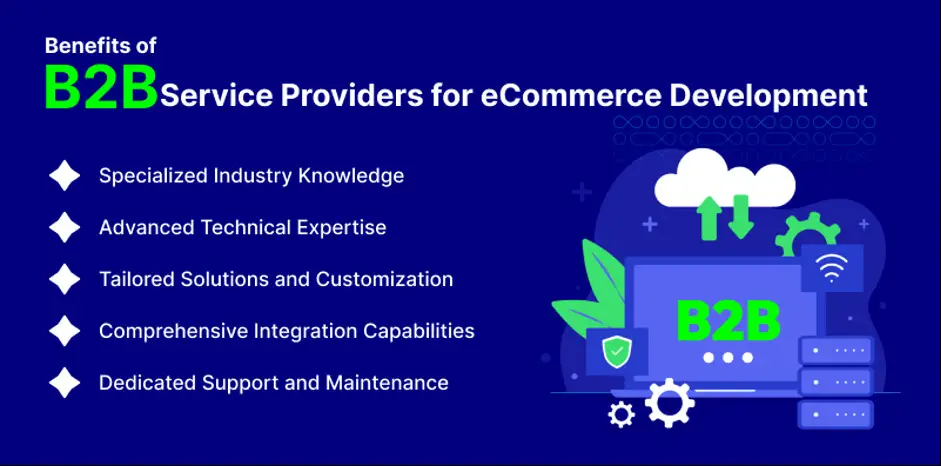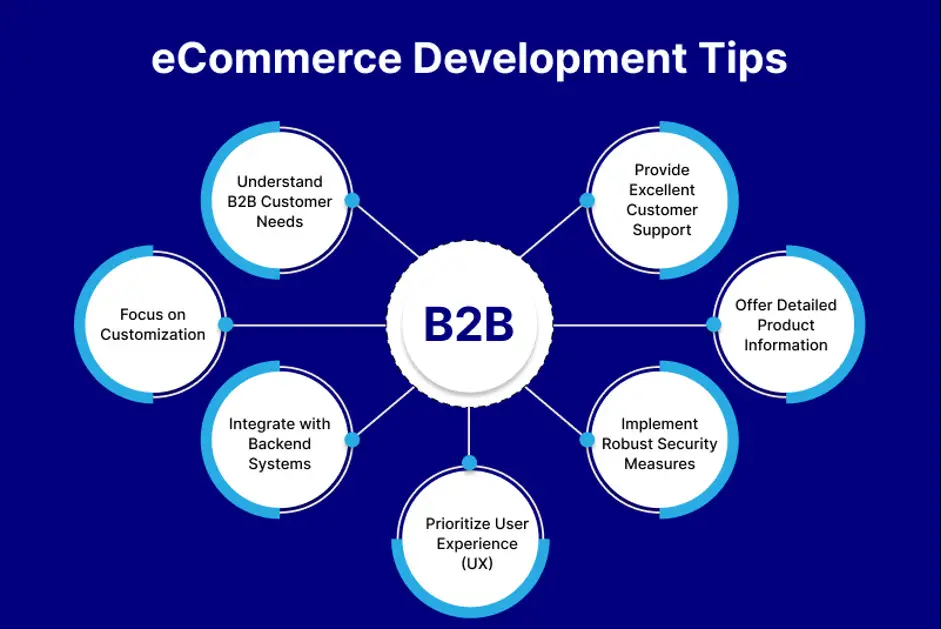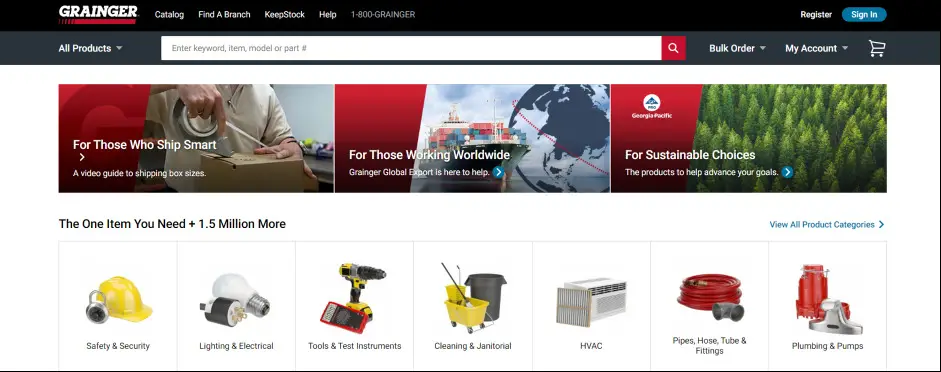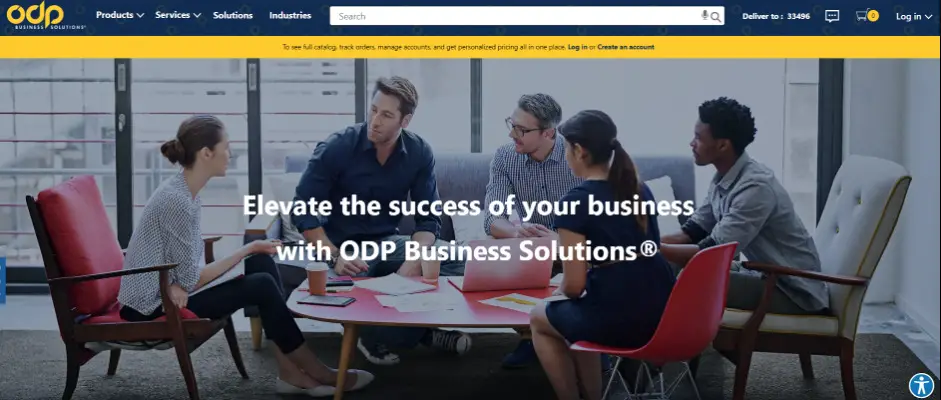Top eCommerce Development Tips for B2B Service Providers

Are you struggling to stand out in the competitive world of B2B eCommerce development services?
With so many businesses vying for attention online, knowing where to start your B2B eCommerce development platform can be overwhelming.
Without the right strategies, you risk falling behind the competition and missing valuable growth opportunities.
Read on to understand the essential B2B eCommerce development strategies that will help you navigate the complexities of online sales and create a successful B2B eCommerce platform that drives results.
Benefits of B2B Service Providers for eCommerce Development
When thinking about eCommerce development, partnering with B2B service providers has several benefits that can greatly improve the effectiveness and efficiency of your project.
Here are a few benefits:

Specialized Industry Knowledge: B2B service providers contribute extensive industry expertise and a thorough comprehension of B2B dynamics. Their proficiency enables them to customize B2B eCommerce solutions to the distinct requirements and intricacies of business-to-business transactions.
When developing solutions that closely match your business requirements, B2B eCommerce development service providers have the insight to integrate with ERP systems, optimize for bulk ordering procedures, or apply unique pricing structures.
Advanced Technical Expertise: B2B eCommerce platforms frequently need sophisticated technical features, like scalable architecture, strong security protocols, and intricate integrations.
B2B service providers are technically and experienced enough to handle these complications easily. By utilizing cutting-edge technologies and frameworks, they can create scalable, secure, and high-performing eCommerce solutions that satisfy the needs of contemporary B2B companies.
Tailored Solutions and Customization: B2B service providers know there is no one-size-fits-all approach to eCommerce. They excel in providing customized solutions that meet the unique requirements of business-to-business customers.
B2B suppliers can comprehensively customize pricing models, catalog management, or customer-specific portals to guarantee a smooth eCommerce platform integration with your current company processes and systems.
- Comprehensive Integration Capabilities: B2B eCommerce success depends on integrating various backend systems (ERP, CRM, inventory management, etc.). By seamlessly combining eCommerce platforms with your current systems, B2B service providers can guarantee real-time data synchronization, optimized processes, and increased productivity. This integration feature increases overall corporate productivity by decreasing human labor and improving workflow automation.
Dedicated Support and Maintenance: B2B service providers have specialized support teams that monitor platform performance, respond quickly to problems, and roll out upgrades to guarantee peak performance.
For eCommerce platforms to run well, post-launch support and maintenance are essential. This proactive support strategy reduces downtime, improves user experience, and gives businesses that depend on their eCommerce infrastructure piece of mind.
Top eCommerce Development Tips for B2B Services Providers
Developing effective B2B eCommerce solutions requires using a particular strategy designed to satisfy the demands of business customers.
Here are some tips for B2B eCommerce development service providers:

1. Understand B2B Customer Needs
Start by thoroughly grasping your B2B clients' distinct requirements and procurement procedures. B2B clients frequently need customized pricing, bulk purchase options, and more comprehensive product information.
For instance, a construction supplies company's B2B eCommerce platform should have features like the capacity to obtain quotations straight from the website, comprehensive product specs, and discounts for large orders.
2. Focus on Customization
Business-to-business (B2B) buyers anticipate individualized service catering to their needs. Providing customization choices can improve user experience and address individual client demands.
Let’s understand it with an example: Building an eCommerce site for office supplies allows companies to create recurring purchases, personalize product bundles, and bargain for lower prices based on order volume.
3. Integrate with Backend Systems
Effective operation depends on seamless connectivity with backend systems like CRM, ERP, and inventory management. This guarantees order processing efficiency, real-time inventory changes, and data consistency.
As an illustration, integrating an ERP system with a B2B eCommerce platform may automate inventory management, guaranteeing that orders are processed quickly and that stock levels are updated in real time.
4. Prioritize User Experience (UX)
It's crucial to have an easy-to-use interface that simplifies the buying process. Large, complicated orders are frequently placed by B2B buyers, so the platform should be simple to use and navigate.
For instance, an easy-to-use checkout procedure, reorder options, and a clear and intuitive navigation menu can significantly improve a B2B electronics distributor's customer experience.
5. Implement Robust Security Measures
B2B transactions involve large orders and sensitive information, making security a top priority. Implementing strong security measures safeguards information and fosters client confidence.
Example: On a B2B pharmaceutical eCommerce platform, the use of SSL certificates, two-factor authentication, and secure payment gateways guarantees the security of transactions and customer data.
6. Offer Detailed Product Information
Giving B2B buyers access to thorough product information, such as datasheets, specs, and user manuals, enables them to make well-informed judgments.
An industrial machinery B2B website should have comprehensive product descriptions, technical details, and downloadable manuals or datasheets.
7. Provide Excellent Customer Support
Dependable customer service is essential in B2B eCommerce best practices. Providing a variety of avenues for assistance and speedy turnaround helps improve client satisfaction.
For instance, to help customers as soon as possible, a B2B eCommerce platform for IT services should have a live chat, a dedicated support hotline, and an extensive FAQ area.
Examples of Successful B2B Service eCommerce Platforms
Here are five successful B2B service eCommerce platforms and how they hired B2B eCommerce developers to excel in their respective industries:
1. Alibaba

Alibaba is a leading global B2B eCommerce platform that connects suppliers and customers. The platform provides a large marketplace with possibilities for bulk ordering, secure payment processing, and comprehensive product listings.
Alibaba's success is attributed to its wide product knowledge, trade assurance program that fosters confidence between suppliers and customers, and comprehensive reach.
2. Amazon Business

Amazon Business offers customized shopping for companies of various sizes, including multi-user accounts, bulk discounts, and connectivity with procurement systems.
Amazon Business guarantees quick, dependable delivery and a smooth shopping experience for business clients by utilizing its extensive infrastructure and logistics network.
3. Grainger

Grainger is an expert in providing goods and services for industrial supplies. The platform provides a simplified ordering process, real-time inventory updates, and comprehensive product catalogs.
Grainger succeeds by offering thorough assistance and an intuitive interface that makes it simple for companies to locate and place efficient orders for their needed products.
4. ThomasNet

ThomasNet provides a comprehensive list of goods and services from various industries, facilitating the connection between industrial customers and suppliers.
ThomasNet's platform helps companies locate trustworthy partners and expedite their procurement procedures by offering comprehensive supplier information, including certifications and capabilities.
5. Office Depot Business Solutions

Office Depot's business-to-business platform offers furniture, technological items, and office supplies, with features such as bulk savings, personalized pricing, and assigned account managers.
The platform concentrates on improving the customer experience through individualized service and adaptable ordering alternatives by meeting the unique requirements of business clients.
In Conclusion
Choosing the right B2B eCommerce development strategies and tips for your business depends on your goals, objectives and requirements. Therefore, you must start by evaluating your business’s advantages, difficulties and opportunities.
We hope the above-mentioned tips on eCommerce development for B2B service providers will help you enhance your retail operations and provide omnichannel customer experiences.
Furthermore, you can also connect with eCommerce development companies for their professional assistance and guidance.




















